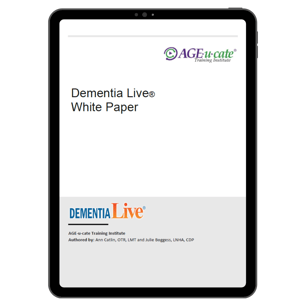Mastering Dementia Education: The 4 Secrets to Experiential Learning

Dementia training and education are all the buzz these days. We need to better prepare our workforce, families, and communities for rapidly rising rates of people living with dementia. How do we tackle this public health priority as we move forward in creating dementia-friendly societies? To better prepare our workforce, families, and communities for this public health priority, we need innovative approaches. One such approach that has shown great promise is experiential learning, which offers a unique and effective way to educate and empower care partners, families, and communities to create dementia-friendly societies.
Let's first discuss the framework of experiential learning. This model offers a uniquely high retention and growth opportunity for participants surpassing traditional education methods. Experiential learning uses a blended education approach, including activity, reflection, communication, feedback, and observation.
So what is the secret sauce to the powerful components of experiential dementia learning and education?
1. Learning by Doing
At the heart of experiential learning is the idea of learning by doing. Unlike traditional classroom style or online learning, experiential learning engages the senses and encourages participants to tap into their own feelings and emotions. By immersing themselves in the experience of living with dementia, participants gain a deep understanding from the inside out, leading to higher retention and growth opportunities. This approach breaks down the barriers to traditional classroom style or online learning by engaging the senses and encouraging the participant to tap into feelings that they experience themselves.
2. Learning through Reflection
In our high-tech, high-speed world, the power of silence and reflection is often a component that is missing in traditional training methods. Experiential learning allows one to walk through an experience soulfully and thoughtfully. By tapping into the powerful emotions one can experience living with dementia, learning takes place from the inside out.
3. Learning by Application
Instead of traditional fact-checking and testing, experiential learning effectively walks the participant from the "aha" moment to apply skills and tools that make sense. The participant bridges the inside-out sensory and emotional experience through this process with greater application to real-world scenarios.
4. Learning through Shared Experiences
When participants engage in like experiences, it creates a golden opportunity to share these learning moments together, providing a comfort zone and an effective platform for problem-solving. This is especially important in the context of dementia education, where the complexity of dementia-related symptoms and the challenges of changing dementia-related behaviors and stress reactions can be overwhelming.There are several unique challenges to effective dementia education and training, among them being:
-
The complexity of dementia-related symptoms
-
The difficulties of changing dementia-related behaviors and stress reactions
-
Professional and family care partners often lack basic dementia understanding
-
Empathy training is essential to improving care for people with dementia, but most training and education do not include this critical component.
Considering these 4 secrets, think about the experiential learning model related to dementia training and education. With the goals of improving the quality of care, reducing stress-related behaviors, reducing caregiver burnout, and practical skill-building - there is overwhelming evidence to support the value of experiential learning for dementia education and training.
As we prepare for a world in which dementia will affect virtually every area of our society, stakeholders who turn to experiential learning will find that when used as a foundational training tool, it is a proven, powerful, and effective means of building awareness, improving one's understanding of dementia and creating more empathetic care partners, families, and communities.





.jpeg)